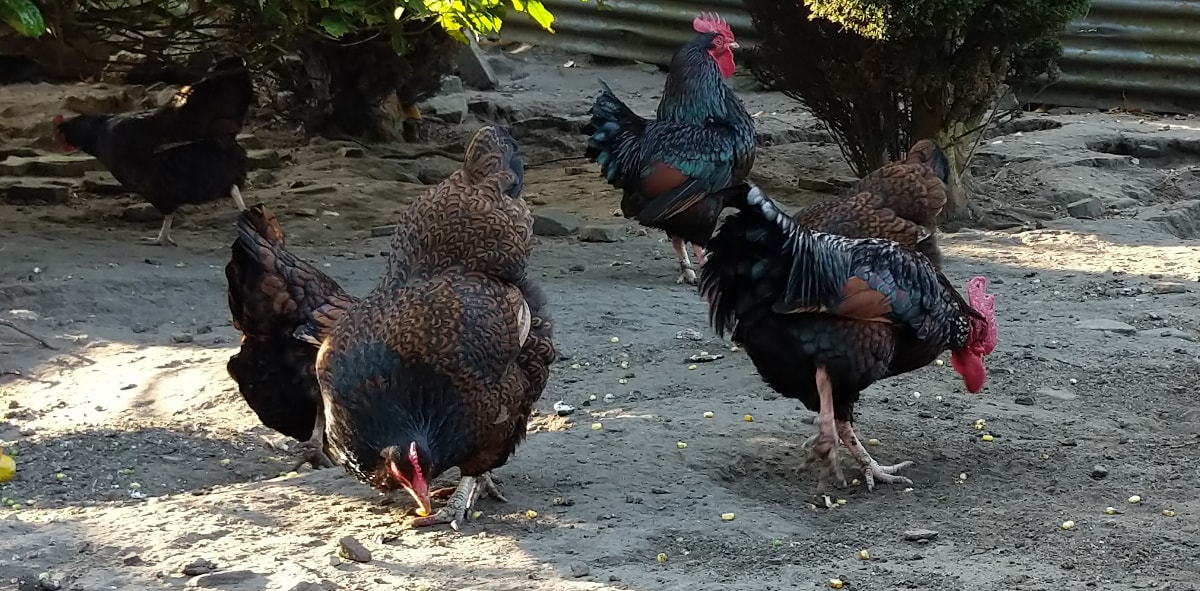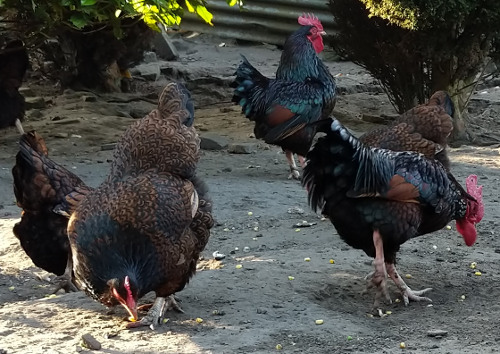Can chickens eat peanuts

We know chickens can eat almost anything, but can they eat peanuts? Recently in an online discussion someone suggested feeding chicken peanuts for improving the weight and egg quality.
Below: Some of my chickens eating peanuts.
I decided to do some research and was immediately overwhelmed by the amount of contradictory information online. It took me some time to filter through and understand whether peanuts can actually be fed to chickens.
This article is the summary of the key insights and conclusions from my research. I have started using peanuts in the fall to help with the moult as they add extra protein and fats.
So Can Peanuts be fed to Chicken?
Yes, cooked and unsalted peanuts are just fine for chickens as a treat. There is some evidence of it being beneficial in egg laying and weight gain but not conclusive enough to start adding large quantities of peanuts to chicken feed.
There are no conclusive studies showing that peanuts that are roasted and unsalted are bad for the chickens.
The green skin of raw peanuts can be found to be harmful for chickens as it contains the same poisonous substance found in green potatoes. So it is safer to stick with roasted, unsalted peanuts.
Some poultry farmers suggest that roasted and unsalted peanuts can be mixed with other feed and given to chicken due to its fat content.
Below: Some of my bantam Barnevelders eating a few peanuts as a treat.

Check the subsequent research/studies mentioned in this article which has a few methods to render peanuts safe for chicken consumption along with ways to balance peanut meal protein.
What’s so great about peanuts anyways?
Peanuts go by various names such as groundnuts, earth nuts goobers etc. Few may notice that they are actually not nuts. Groundnuts are in fact related to the legume family more like a being a lentil or soy.
Peanuts are supposed to be healthy. They are rich in protein fat and various minerals and vitamins. Only 13 to 16% of the total weight is carbs, the rest belongs to protein fat (highest concentration) and fibre.
Peanuts have a high fat content. This is in the form of mono and polyunsaturated fatty acids-about 45%-55%. Most of these are in the form of oleic and linoleic acids. This is the reason why most of the peanuts produced in the world are used for production of peanut oil. The fatty acids are helpful for improving chicken health, weight gain and egg laying as well.
Peanuts also contain various vitamins and minerals and they are seen as an excellent source for the following:
- Biotin
- Copper
- Niacin
- Folate
- Manganese
- Vitamin E
- Phosphorus
- Magnesium
- Selenium
All the above are minerals and vitamins that contribute to bone health and egg quality.
So feeding shelled and cooked, unsalted peanuts is in no way harmful to chickens.
Peanuts are also known to contain a lot of antioxidants. Most of the antioxidants are located in the skin. Some of the antioxidants present in peanuts are:
- P Coumaric acid
- Resveratrol
- Phytic acid
- Phytosterols
Naturally obtained antioxidants have been seen to have beneficial effects on the growth and health maintenance and enhancing reproductive health of poultry. Since peanuts have high nutrient value and are affordable and easily available. It is an ongoing topic of research on whether it can be used for enriching chicken feed so as to promote health of the chickens.
Can chicken eat raw peanuts?
Raw peanuts are not recommended for chicken because they contain an enzyme trypsin which may be harmful.
The enzyme trypsin as well as solanine in the peanut skins are harmful for the health of birds. Another problem with peanuts that you get from shops and feeding them to the chicken is that they have salt content ( usually as that is what makes the peanuts tasty).
Salt can be very harmful to chickens.
If you want, you could make roasted and unsalted peanuts and feed them to the chickens because they are rich in proteins and fats.
Solanine and its Toxic effects on Chicken:
Solanine is a glycoalkaloid. It is usually found along with the chlorophyll and concentrated in the green areas. In the case of raw peanuts, the green skins contain Solanine. It is actually a natural defence of the plants against pests. While it protects the plants it can be harmful for humans as well as chicken and farm animals too. It is a neurotoxin. Solanine poisoning may lead to chicken deaths.
(Note:It is not in peanuts alone, solanine is found in green potatoes so feeding potato peels or peanuts skins can be dangerous).
How to make peanuts safe for consumption for chickens?
Take the required amount of shelled peanuts. Make sure that you use raw and unsalted peanuts. Salt is detrimental for the bird. You can now roast the peanuts for 20-30 mins at 300 degree Fahrenheit. Make sure you continuously stir them to ensure all the peanuts are roasted.
By doing this you can destroy the effect of the trypsin inhibitor enzyme which is harmful for the bird. Once the trypsin inhibitor is removed the peanuts can be consumed by the bird with less harmful effects.
What about peanut skins? Are they really harmful for chickens?
In an article published by Comfort C. Atuahene, A. Donkoh & K. Mensah‐Afoakwah (1989- Article:Value of peanut skins as a dietary ingredient for broiler chickens, British Poultry Science, 30:2, 289-293, DOI: 10.1080/00071668908417150 ), they describe a study that was conducted by trying diets with different concentration of peanut skins that were fed to 1 day old broiler chicks which were of the Cobb 100 strain. The diets were continued for 7 weeks.
They found that the consumption of peanut skins had no harmful effects nor were there any deaths attributed to the consumption. They also could find significant correlations of the concentration of the peanut skins in diet to weight gain.
So again it can be safely assumed that as long as the peanut skins are roasted and not green with the solanine removed, they are not harmful for the chickens.
Use of peanut meal for chicken feed:
Edwards and Massey (1941) did a study that concluded that the use of peanut meal in feeding poultry has been found to be satisfactory, economical and efficient.
They go on to say in the study that peanut meal provides vegetarian protein of very high quality which when properly used can lead to body weight maintenance and helps egg production.
But peanut meal protein has to be balanced with buttermilk or skimmed milk to achieve better performance.
Concerns for using peanut meal as feed:
There are 2 major nutritional concerns when using peanut meal as feed:
- The first issue is threonine levels are much lower in peanut meal and could not be supported in cases of threonine deficiency.
- The second issue is that peanuts meal is prone to aflatoxin contamination so proper quality measures have to be taken to ensure that this doesn't occur.
But other than this peanut meal is often seen as an attractive feed to be given to chicken. It has the same protein levels as soybean based feed. The fat content is also larger and can benefit egg laying. Compared to grains the peanut and soybean feeds provide a good source of amino acids necessary for their growth.
Concluding thoughts on feeding chickens peanuts:
Through all my readings I have come to the conclusion that peanuts are not harmful if it is roasted and unsalted. But there is not conclusive evidence of any special benefits of depending on peanuts as one of the major sources of nutrition.
It would be harmless to feed your chickens peanuts roasted and unsalted) once in a while,but not advisable to have it as a regular component of your choices of nutrition for the chickens.So explore other possible sources of nutrition which can be health enhancing for your chickens.
References:
* Comparison of Peanut Meal and Soybean Meal as Protein Supplements for Laying Hens 1G. M. Pesti,2R. I. Bakalli, J. P. Driver, K. G. Sterling, L. E. Hall, and E. M. Bell
* Value of peanut skins as a dietary ingredient for broiler chickens, British Poultry Science, 30:2, 289-293, DOI: 10.1080/00071668908417150
